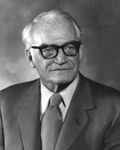Alaska Mental Health Enabling Act
Alaska Mental Health Enabling Act
The Alaska Mental Health Enabling Act of 1956 was a significant piece of legislation in the United States that aimed to address mental health issues in the Territory of Alaska. The act provided for the establishment of a comprehensive mental health program in Alaska, which was crucial for the territory's development and the well-being of its residents.
Background
Prior to the enactment of the Alaska Mental Health Enabling Act, mental health services in Alaska were severely limited. The territory lacked adequate facilities and resources to care for individuals with mental illnesses. This situation prompted the need for federal intervention to establish a structured mental health system.
Legislative History
The act was introduced by Edward Lewis Bartlett, who was the Delegate to the U.S. House of Representatives from the Territory of Alaska. The legislation faced significant opposition and controversy, particularly from groups who feared it would lead to abuses of power and involuntary commitments.
The act was eventually passed by Congress and signed into law, marking a pivotal moment in the development of mental health services in Alaska. It provided for the transfer of federal lands to the territory to support the establishment of mental health facilities and programs.
Provisions of the Act
The Alaska Mental Health Enabling Act included several key provisions:
- Land Grant: The act granted one million acres of federal land to the Territory of Alaska to support mental health services.
- Funding: It authorized federal funding to assist in the construction and operation of mental health facilities.
- Program Development: The act mandated the development of a comprehensive mental health program, including the establishment of hospitals and clinics.
Controversy and Opposition
The act faced opposition from various groups, including those who feared it would lead to the creation of "mental health gulags" where individuals could be committed without due process. This opposition was fueled by the political climate of the time, which was marked by fears of communism and government overreach.
Prominent figures such as Barry Goldwater voiced concerns about the potential for abuse under the act. Despite these concerns, the act was ultimately passed, reflecting a compromise between the need for mental health services and the protection of individual rights.
Impact and Legacy
The Alaska Mental Health Enabling Act laid the foundation for modern mental health services in Alaska. It enabled the construction of facilities and the development of programs that continue to serve the state's residents today. The act is considered a landmark in the history of mental health legislation in the United States.
Related Pages
Gallery
Transform your life with W8MD's budget GLP-1 injections from $125.
W8MD offers a medical weight loss program to lose weight in Philadelphia. Our physician-supervised medical weight loss provides:
- Most insurances accepted or discounted self-pay rates. We will obtain insurance prior authorizations if needed.
- Generic GLP1 weight loss injections from $125 for the starting dose.
- Also offer prescription weight loss medications including Phentermine, Qsymia, Diethylpropion, Contrave etc.
NYC weight loss doctor appointments
Start your NYC weight loss journey today at our NYC medical weight loss and Philadelphia medical weight loss clinics.
- Call 718-946-5500 to lose weight in NYC or for medical weight loss in Philadelphia 215-676-2334.
- Tags:NYC medical weight loss, Philadelphia lose weight Zepbound NYC, Budget GLP1 weight loss injections, Wegovy Philadelphia, Wegovy NYC, Philadelphia medical weight loss, Brookly weight loss and Wegovy NYC
|
WikiMD's Wellness Encyclopedia |
| Let Food Be Thy Medicine Medicine Thy Food - Hippocrates |
Medical Disclaimer: WikiMD is not a substitute for professional medical advice. The information on WikiMD is provided as an information resource only, may be incorrect, outdated or misleading, and is not to be used or relied on for any diagnostic or treatment purposes. Please consult your health care provider before making any healthcare decisions or for guidance about a specific medical condition. WikiMD expressly disclaims responsibility, and shall have no liability, for any damages, loss, injury, or liability whatsoever suffered as a result of your reliance on the information contained in this site. By visiting this site you agree to the foregoing terms and conditions, which may from time to time be changed or supplemented by WikiMD. If you do not agree to the foregoing terms and conditions, you should not enter or use this site. See full disclaimer.
Credits:Most images are courtesy of Wikimedia commons, and templates, categories Wikipedia, licensed under CC BY SA or similar.
Contributors: Prab R. Tumpati, MD




